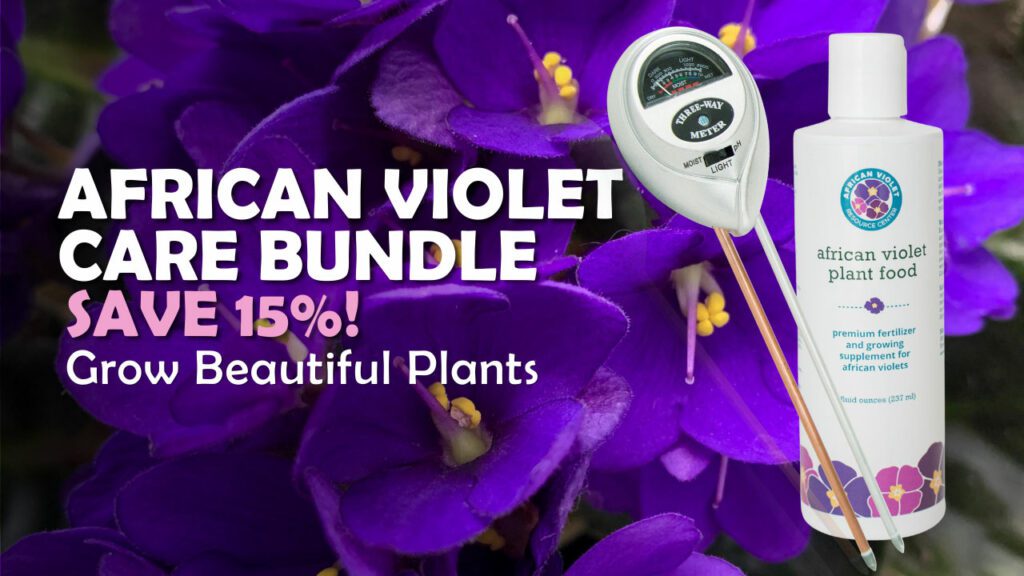If you have plants and pets, you might wonder how to maintain both and keep everyone safe. You don’t want to come home to spilled plants or a pup with an upset belly. Living with both is easier if you know what plants won’t harm your furry friends and if you train your pet to leave them alone. The answer is no when asking if African violets are poisonous to your dog; neither the plants nor the leaves are poisonous to your pet.
Are African Violets Toxic?
While African violets are not poisonous to your pets or family, you will want to monitor your pets around them. This is because of a possible allergic reaction to the sap from the foliage if they consume a large amount of the plant.
Nothing in the plant attracts your pet to it other than the pretty colors and general curiosity. Touching the plant will not cause any harm, nor will smelling it. The only potential harm from the plant is if your dog decides to snack on the leaves.
The sap or saponins can cause vomiting, diarrhea, upset stomach, or cramping when consumed in large quantities. For this reason, it’s good to keep the plants out of your dog’s reach. Any potential toxicity for exposure is low as long as the plants are not within reach of curious paws and mouths.


What Harm Can African Violets Do if Touched or Ingested?
As mentioned above, if you notice your pet has an upset stomach, vomiting, or diarrhea, consider if they have been near your African violet plant. If you notice leaves that have been chewed, their upset stomach may be from eating the plant.
Minor consumption most likely will not cause symptoms, but they’re more likely to become sick if they’ve eaten a lot. Knowing that, once you check your plant, you should be able to tell if it’s been bothered to the point of major consumption.
Besides the concern about a reaction to the saponins in the plant, you also want to pay attention to fertilizer use. Suppose you’re interested in supporting your plant’s growth. In that case, you can try an all-natural indoor plant food specifically formulated for your African violet.
Safe Use of Fertilizers
When considering what may have made your pet feel ill, consider your fertilizer. The effects can be mild or serious when our dogs come into contact with fertilizer products, which could contain harmful chemicals. Herbicides, fungicides, pesticides, phosphorus, iron, and nitrogen are toxic when eaten in large amounts. Depending on the length of exposure to the fertilizer and how it got into their body, they could get oral burns, stomach irritation, or even die.
If you think your dog has eaten fertilizer or you just used it in your garden and your pup is acting sick, take them to the vet right away. Fertilizers we use in our gardens can be very dangerous to our pets if they eat them or get them on their skin or mucous membranes.
If you are concerned, call your veterinarian and provide them with the type of fertilizer used and your pooch’s symptoms.
Symptoms and Treatment of Toxicity in Dogs
If you notice your dog has been in the African violets, or they seem to have some slight belly issues, keep a close eye on them to see if they throw up or have diarrhea. If they seem to have an upset stomach, don’t feed them for 24 hours to give their body time to get rid of whatever is making them sick.
Take your dog to the vet immediately if they show signs of distress, like excessive salivation, panting, or tiredness. It’s a good idea to take a sample of the plant and the soil it was planted in. If you know the name of any fertilizer used, that’s even better.
How to Stop Your Dog From Eating Your Plants
Noticing that your dog is snacking on your plants is not only frustrating but also possibly scary. You don’t want them getting into anything harmful! Thankfully, there are a few things you can try to discourage your furry buddy from hanging around your plants. You might need to try a few things, especially if moving the plants out of their reach isn’t feasible.
Training
Reinforcement! As with any training you’ve done with your pet, the same methods will work. Tell your pet no and move them away from the plant. Reward them for positive behavior. They will learn the plant area is off-limits with consistency.
This will only work while you’re sitting there with your pet. Telling them no once they’ve already eaten the plant might be ineffective as they might not connect the two.
Clicker training is a positive reinforcement training used for various behavior modifications. The “clicker” in question is a tool that makes a noise, distracting your dog. With consistency and positive reinforcement, they learn that when they hear noise, they should stop. Eventually, they no longer need to hear the noise to know they shouldn’t be doing the behavior.
Distractions
Redirection! Much like reinforcement, you are introducing something to redirect your pet from the plant. This method takes consistency and patience. With time, your dog will understand they should leave the plant alone.
Deterrents
Spray diluted lemon juice on the plants. Most pooches dislike the taste of lemon, so lightly spraying your plants with diluted lemon juice should deter them. If your pet is in the minority and enjoys the taste, this won’t be the best method to use!
You can try a light spray of vinegar on your plants, but make sure it will not affect your plant’s growth before choosing this option. White vinegar is best if you’re going to try this option.
Placement of Plants
Move the plant out of their reach! You can use hanging planters or plant stands and place the plants on furniture out of your dog’s reach. For many, this is the easiest answer. This decision eases any risks while still allowing you to enjoy your houseplants.
Other Safe Plants for Dogs
Banana Tree: This plant dramatically impacts any home with its large leaves and height. Keep in mind that the banana tree needs lots of natural light and regular watering.
Spider Plant: This plant is easy to grow and safe for your pooch. Often found hanging, they do well in various streams of light. Their leaves can stretch as long as 18 inches. They’re easy to grow and propagate as plantlets fall off naturally as the plant grows.
Christmas Cactus: This plant packs a punch of color during the winter when you’re counting the days until spring. This plant is also easy to propagate, requiring little care and low levels of light.
Venus Trap: Not only is the Venus flytrap fun to grow, but it’s also safe for your pets. These plants do well in bright light, but you will need to consider what water you’re using. Many Venus flytrap enthusiasts feel tap water is actually harmful to them.
Wax Plant: The wax plant is pretty with its dainty flowers but also smells nice. Be mindful that their leaves do burn in the sun. They like bright light but do not need to be in direct light.
Bamboo: Some believe the bamboo plant will bring luck to any space. Whether true or not, this plant is easy to grow, safe for your dogs, and thrives in several light conditions.
FAQ: Are African Violets Poisonous to Dogs?
Are African violet leaves edible?
No. You will need to monitor your pet to make sure they do not eat the leaves of your African violet. One or two might not bother them, but eating them in large amounts can give them quite the bellyache.
Are African violets toxic to cats?
No. As with dogs, the African violet plant is not toxic to cats.
Final Thoughts
Enjoy growing your African violet plants in your home knowing your dog should be fine as long as you keep the plant out of their reach. This plant is easy to grow, and as long as you maintain it consistently, it should grow successfully in your home.
Looking for more houseplant info? You can find more information on African violets when checking out our African Violet Resource Center page or joining our Facebook group!





